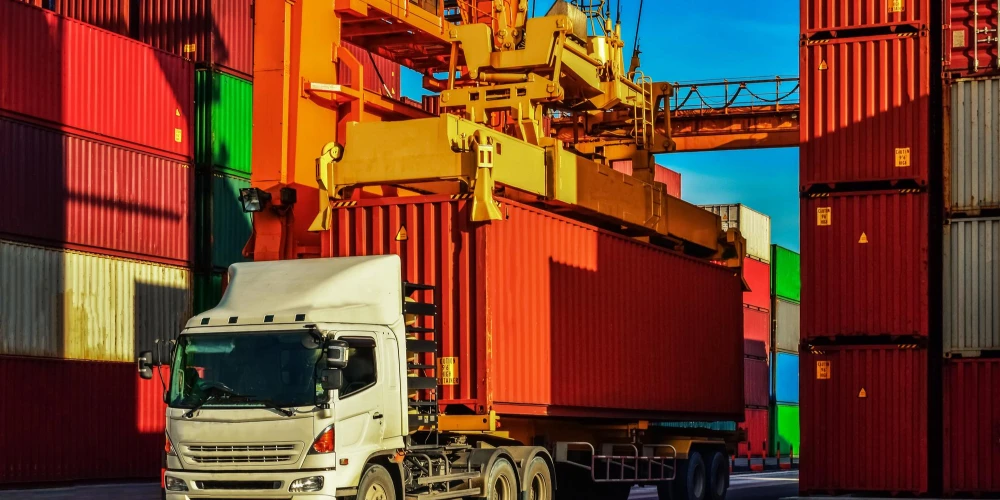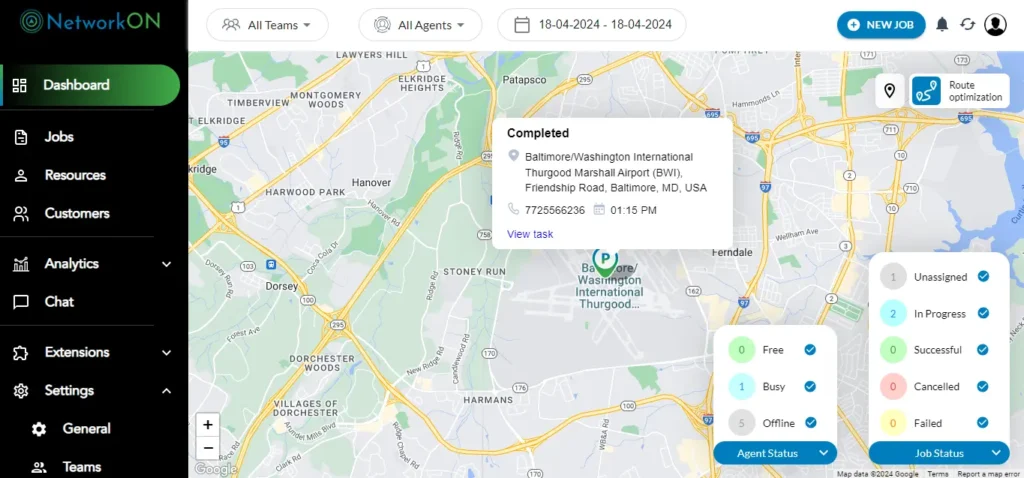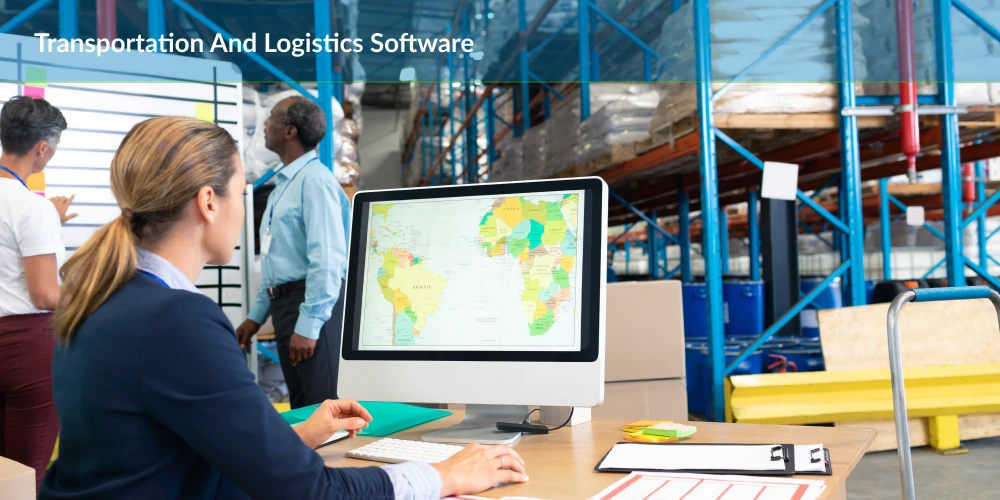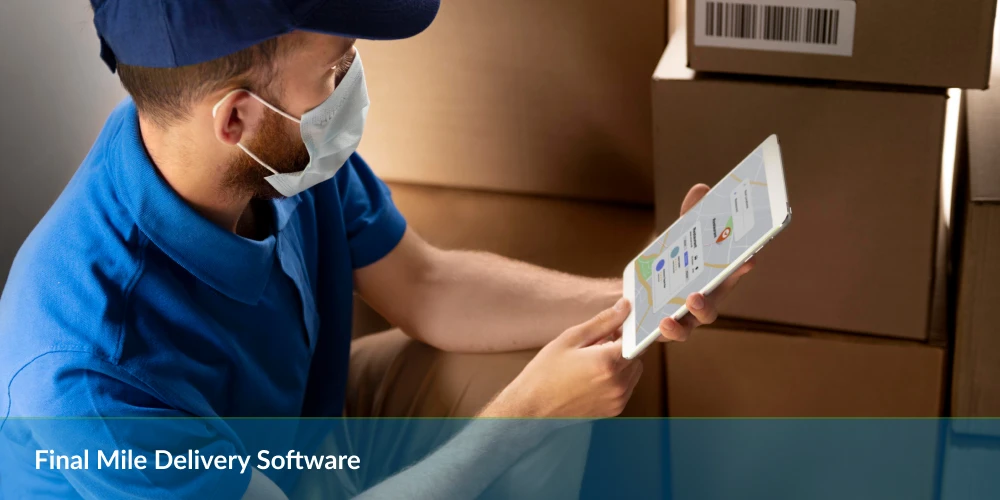Table of Contents
Advanced software is revolutionizing the transportation and logistics industry, which is at the heart of global trade. By boosting connectivity and offering real-time data, these innovations enable businesses to overcome traditional barriers and achieve remarkable efficiency and performance.

Embracing these advancements, industry leaders look to real-time tracking as an add-on to their services and as the backbone of a robust system where every moving part is transparent and accountable. The significance of such precise tracking at one’s fingertips cannot be understated; it enables proactive management, enhances customer trust, and provides data-driven insights that were once impossible.
Indeed, the future of transportation and logistics lies in digitalization. From streamlining workflows to integrating sophisticated analytics, modern software does not just upgrade service quality but completely redefines it. As we delve into transportation and logistics software‘s core benefits and innovative features, let’s uncover how your business can adapt to and thrive within this digital era.
Optimizing Logistics with Advanced Transportation Management Systems (TMS)
Transportation Management Systems (TMS) have become the cornerstone of modern logistics, offering unparalleled potential to streamline transport operations and ensure better outcomes. These systems serve as a critical tools in the logistics and supply chain spanning various industries, helping companies move goods efficiently and reliably.
Streamlining Transport Operations for Better Outcomes
By leveraging TMS, businesses can optimize their entire transportation workflow. This includes automating the planning, execution, and optimization processes of the physical movement of goods, both inbound and outbound. Such streamlining often leads to substantial cost savings and performance improvements.
Route Optimization for Timely Delivery

One of the most significant features of a TMS is its ability to analyze historical data and real-time inputs to determine the most efficient delivery routes. This ensures timely delivery to the end customer and contributes to lower fuel consumption and reduced wear and tear on transportation assets.
Integrating TMS with Existing ERP Systems
For businesses already utilizing Enterprise Resource Planning (ERP) systems, integrating TMS can result in harmonized operations and better visibility across the organization. This integration leads to more accurate forecasting, improved inventory management, and a comprehensive overview of the entire supply chain.
Benefits of Using TMS for Logistics Companies
- Cost Reduction: TMS helps identify cost-saving opportunities through mode selection, load consolidation, and carrier mix optimization.
- Enhanced Visibility: Real-time tracking of shipments allows for proactive management of any in-transit issues and comprehensive performance reporting.
- Improved Customer Service: With accurate tracking and timely deliveries, businesses can improve service quality, fostering customer loyalty and trust.
- Scalability: As a company grows, TMS can easily scale to meet increased demand, handling more complex routes and supply chain scenarios.
Revolutionize Your Supply Chain with Advanced SCM Software
Supply Chain Management (SCM) software has become an intrinsic component in modernizing global supply chains. SCM software drives efficiency and value throughout the supply network by enhancing coordination and collaboration between various facets of the transportation and logistics ecosystem.
Coordination and Collaboration in Supply Chains
Effective SCM software streamlines the flow of goods and the critical flow of information and finances that move alongside them. SCM facilitates a synchronized supply chain by fostering real-time communication and collaboration between manufacturers, suppliers, distributors, and retailers, minimizing delays and reducing bottlenecks.
How SCM Enhances Overall Transport Planning
Transport planning is the backbone of logistics, and SCM software provides high precision. By integrating various transportation modules, such as route planning and carrier selection, SCM software ensures optimal resource utilization and timely deliveries, cutting costs and boosting customer satisfaction.
Leveraging Predictive Analytics and Big Data for Demand Forecasting
Using predictive analytics and big data, SCM software anticipates customer demand, enabling businesses
to proactively plan their production and distribution strategies. This foresight minimizes the risk of stock shortages or overproduction, ensuring a lean and responsive supply chain.
The Intersection of SCM and Efficient Inventory Management
Efficient inventory management is critical, and SCM software sits at its intersection. By monitoring stock levels in real-time and automating reordering processes, SCM ensures that inventory is kept at optimal levels. This significantly reduces the cost of holding excessive inventory while preventing potential stockout sales losses.
In essence, SCM software is not just a tool for managing logistics; it is a strategic asset that can give businesses a competitive edge in the complex, fast-moving world of transportation and logistics. With sophisticated features that address every link in the supply chain, SCM software solutions are indispensable for businesses looking to thrive in today’s market.
Fleet Management Solutions
Transportation and logistics software has become critical to modern fleet management solutions. Companies can reduce operational costs and enhance efficiency by optimizing fleet performance and compliance. Advanced software systems are at the forefront of this transformation, paving the way for smarter, more responsive fleet operations.
Optimizing Fleet Performance and Compliance
The cornerstone of effective fleet management is optimizing vehicle performance and ensuring strict adherence to compliance regulations. Modern transportation and logistics software provides comprehensive tools to monitor vehicle health, track driver performance, and automate maintenance scheduling. These capabilities ensure fleets run at peak efficiency while adhering to safety and compliance standards.
Realizing the Potential of IoT and AI in Fleet Management
Integrating the Internet of Things (IoT) and Artificial Intelligence (AI) with fleet management solutions unlocks new possibilities for predictive analytics and real-time decision-making. With IoT devices, fleets can enjoy enhanced GPS tracking, condition monitoring, and asset management. Meanwhile, AI algorithms can process large datasets to forecast potential issues and recommend optimal routes, leading to decreased downtime and increased productivity.
Ensuring Compliance and Security Through Advanced Software Solutions
Advanced fleet management software is well-equipped to navigate the constantly evolving landscape of transportation regulations. These solutions provide updated compliance information and security protocols to protect sensitive data, ensuring that fleets meet regulatory requirements and safeguard against cyber threats.
Minimizing Idle Times and Managing Fuel Consumption
Fuel consumption represents a significant expense for fleets, and minimizing idle times is key to managing costs. Transportation and logistics software empowers businesses to track and analyze fuel usage and idling trends. By collecting this data, fleet managers can implement strategies to reduce unnecessary fuel consumption, lowering operational costs and environmental impact.
- Performance Tracking: Real-time monitoring of each vehicle’s performance to detect and address issues promptly.
- Fuel Management: Sophisticated tools for tracking fuel usage and identifying opportunities to improve fuel efficiency.
- Route Optimization: Dynamic routing algorithms to ensure the most efficient use of resources and time.
- Compliance Automation: Automated reporting functions to streamline compliance with regulatory requirements.
Optimize Your Storage: Warehouse Management Systems (WMS) Unveiled
Warehouse Management Systems (WMS) are at the heart of modern logistics, pivoting in streamlining warehouse operations for quicker turnaround times. As part of a comprehensive transportation and logistics software suite, WMS provides a crucial link between goods receipt and delivery, ensuring efficiency and accuracy in inventory management.
Streamlining Warehouse Operations for Quicker Turnaround
Integrating WMS into the supply chain greatly expedites the process from storage to shipment. Efficient use of space, optimized picking procedures, and automated data collection reduce the time needed for goods to move through the warehouse. This makes for faster order fulfillment and ultimately leads to increased customer satisfaction.
Automating with AGVs for Warehouse Efficiency
Automation is reshaping warehouse operations. Using Automated Guided Vehicles (AGVs) within WMS frameworks is a game-changer, enabling warehouses to operate with higher precision and less manual labor. AGVs can transport goods between locations reliably and without fatigue, leading to uninterrupted warehouse functioning and better overall efficiency.
The Role of WMS in Inventory Management
A robust WMS serves as the backbone of effective inventory management. With real-time tracking of stock levels and movements, warehouses can minimize stockouts and prevent overstocking. The system’s accuracy in recording item locations and quantities allows for predictive inventory management and advanced forecasting, thus enhancing decision-making at all levels of the supply chain.
ERP Integration to Synchronize Warehouse and Transportation Activities
Integrating WMS with an Enterprise Resource Planning (ERP) system is essential for synchronizing inventory and logistics activities. This harmony enables seamless data flow between warehouse operations and transportation management, improving order processing, procurement, and delivery. ERP and WMS integration are key drivers in achieving a cohesive and transparent supply chain.
- Enhanced visibility across the supply chain
- Improved resource allocation and workforce management
- Decreased errors and losses due to manual handling
- Tighter control and compliance with industry regulations
Advanced Logistics Software Capabilities
The transportation and logistics software landscape has evolved dramatically, leveraging technological advancements to streamline operations and enhance efficiency. At the forefront of this evolution are several key features that set advanced logistics software apart from traditional management systems. These capabilities transform how logistics companies approach some of their most complex challenges.
Routing and Scheduling for Enhanced Delivery Precision
Modern logistics platforms can dramatically improve delivery accuracy and timeliness with state-of-the-art routing and scheduling algorithms. These tools analyze myriad factors to generate optimized routes, including traffic patterns, delivery windows, vehicle capacity, and customer preferences. The benefits are clear: decreased drive times, improved customer satisfaction, and reduced operational costs.
Utilizing software for dynamic routing and scheduling ensures that changes in operations—such as order cancellations or urgent delivery requests, are automatically accounted for, minimizing disruptions and maintaining service levels.
Another significant feature is cargo and load planning optimizations, enabling companies to maximize their vehicle space. By smartly matching cargo weight, volume, and compatibility, advanced software facilitates maximum load efficiency, critical for profitability and environmental sustainability.
Implementing Real-Time Tracking and GPS
The transportation and logistics landscape is ever-changing, and integrating Real-Time Tracking and GPS technologies has become an imperative facet of the industry. Companies striving for excellence in their operations must recognize the immense value that real-time data provides.
The Necessity of Visibility in Transport and Logistics
Visibility is the cornerstone of a robust transportation and logistics network. Transportation and logistics software with real-time tracking capabilities empowers businesses to monitor their freight at every journey stage. This enhanced oversight increases operational efficiency and reinforces accountability amongst all stakeholders.
Increasing Accuracy in Delivery Tracking
Accurate delivery tracking is not just an expectation; it’s a demand from clients who seek precision in every consignment. Real-time tracking and GPS technologies ensure that every package can be accounted for, reducing errors and eliminating the risks associated with lost or delayed shipments. This accuracy fortifies the supply chain, allowing companies to promise and deliver exceptional service quality.
Enhancing Customer Service through Real-Time Updates
Transportation and logistics software must accommodate the need for instant customer gratification. Real-time updates are essential in meeting and exceeding customer expectations. By implementing advanced tracking solutions, businesses can provide customers with live updates and proactive support, ultimately driving customer satisfaction and loyalty.
- Instantaneous location reporting ensures complete transparency with clients.
- Automated alerts for shipping milestones keep clients informed at every step.
- GPS tracking reduces turnaround times, leading to faster delivery.
Embracing these technological advancements is not a luxury but a necessity for superior logistical performance. As the industry evolves, so should the tools we use to streamline transportation and logistics processes, ensuring businesses stay ahead of the curve.
Freight Forwarding and Cargo Management
The domain of global logistics commands a seamless, efficient orchestration of goods from origin to destination. Recognizing the challenges faced in freight forwarding and cargo management, sophisticated software solutions stand at the vanguard, offering unparalleled operational oversight and strategic agility within this complex landscape.
Software Solutions for Global Logistics Challenges
Modern transportation and logistics software is engineered to tackle the intricate demands of global trade. By integrating advanced technologies, these platforms deliver comprehensive tools designed to streamline freight forwarding processes, optimize cargo load management, and ensure compliance with international shipping regulations. With the ability to adapt to rapidly changing market conditions, logistics professionals can respond proactively, maximizing efficiency and reducing the risk of costly delays.
Managing Global Shipments with Freight Forwarding Software
Effective global shipment management is a fundamental aspect of freight forwarding. Innovative software systems provide end-to-end visibility, allowing logistics coordinators to monitor consignments across every journey stage. Strong data analytics capabilities transform vast amounts of shipment data into actionable insights, enhancing decision-making processes and elevating service standards.
Transportation and logistics software empowers businesses to execute international transport plans precisely, ensuring that every consignment reaches its destination through the optimized allocation of resources and adherence to budgetary constraints.
Customer Relationship Management (CRM) in Logistics
Customer relationship management (CRM) is pivotal for the success of any industry. In transportation and logistics, its role becomes even more critical. At the core of logistics operations lies the promise of delivering exceptional service and fostering enduring customer partnerships. Let’s explore how an effective CRM system can be a game-changer in the logistics industry.
Building and Maintaining Customer Trust
Trust is the cornerstone of any client-provider relationship. In logistics, this trust is cultivated through consistent and reliable service delivery. A sophisticated CRM system allows logistics companies to keep meticulous records of client interactions, preferences, and feedback. By leveraging this data, businesses can personalize services, predict customer needs, and respond proactively to issues, strengthening customer loyalty and trust.
Using CRM to Streamline Logistics Communications
Efficient communication is the lifeblood of logistics operations. With a robust CRM platform, information flows seamlessly between shippers, carriers, and end-recipients. Real-time updates, shipment tracking, and personalized alerts ensure that all parties are informed and aligned. The ability to facilitate this level of communication through a single system simplifies the complexity of logistics networks and enhances operational transparency.
How CRM Integrates with Logistics to Improve Service Levels
Integration is key in the digital landscape of transportation and logistics. A comprehensive CRM system that unifies various aspects of logistics—from order processing to delivery—provides a holistic view of the customer journey. This integration enables logistics providers to anticipate challenges, plan more effectively, and deliver a higher level of service by being attentive to every detail of the customer experience. The synergy between CRM and logistics ultimately improves service levels and customer satisfaction.
- Scalability: Adapting to growing customer bases without compromising on service quality.
- Personalization: Offering tailored logistics solutions that cater to individual customer requirements.
- Responsiveness: Responding swiftly to customer inquiries and adapting to market changes efficiently.
Embracing advanced CRM technologies in logistics paves the way for more reliable, efficient, and user-friendly experiences. As transportation and logistics software evolves, integrating CRM systems remains a key component for businesses seeking to maintain a competitive edge and achieve long-term success.
Managing E-commerce Logistics Challenges with Software
E-commerce logistics faces numerous challenges, from inventory management to shipping coordination. Advanced transportation and logistics software empowers businesses to overcome these obstacles by offering tailored solutions for better demand forecasting, automating warehouse operations, optimizing delivery routes, and efficiently managing carrier selections.
- Improves inventory visibility and control
- Reduces errors in order fulfillment
- Enables dynamic rate shopping for cost-effective shipping
- Enhances customer experience with faster delivery options
The Impact of E-commerce on Reverse Logistics and Software Solutions
E-commerce also revolutionizes reverse logistics, the process of handling returns and exchanges. This increase in return flows demands robust software solutions to ensure a seamless customer return process while maintaining profitability. Logistics software specializing in reverse logistics allows businesses to track returned items, manage restocks or disposals, and analyze return patterns for strategic improvements.
Innovation in Transportation with AI and IoT
The transportation and logistics software landscape is undergoing a radical transformation thanks to the advent of Artificial Intelligence (AI) and the Internet of Things (IoT). These technologies pave the way for unprecedented efficiency and effectiveness in transportation systems. By integrating AI and IoT, logistics companies enhance operational processes, improve customer satisfaction, and drive significant cost savings.
Harnessing AI for Smarter Route Planning and Delivery Predictions
AI is revolutionizing the way transportation routes are planned and monitored. Logistics software with AI algorithms can predict the best routes in real-time, considering traffic patterns, weather conditions, and delivery windows. This capability ensures faster delivery times and optimizes fuel consumption, which reduces operational costs.
Incorporating IoT for Real-Time Fleet Management
IoT technology has become integral in monitoring and managing fleets with pinpoint accuracy. Sensors and trackers on vehicles provide continuous data on vehicle health, location, and usage patterns. This real-time visibility enables logistics companies to respond swiftly to incidents, schedule preventive maintenance, and ensure that each vehicle is utilized to its fullest potential.
Blockchain Technology in Logistics
Blockchain technology has ushered in a new era of transparency and security within the transportation and logistics industry. By integrating blockchain into logistics processes, companies can achieve a level of oversight that was previously unattainable.
Enhancing Transparency and Security with Blockchain
Blockchain technology provides an indisputable record of transactions that is accessible and visible to all parties involved in the supply chain. This digital ledger cannot be altered retroactively, effectively reducing the risks of fraud, errors, and unauthorized tampering. Every step can be traced and verified from when goods leave the manufacturing plant until they reach their final destination.
The Benefits of Blockchain for Compliance and Security in Logistics
Compliance with regulatory standards and ensuring security are paramount challenges in global logistics. Blockchain aids in meeting these challenges by providing an ecosystem for data sharing that is both secure and immutable. For instance, blockchain can help in:
- Streamlining customs clearance by providing accurate, tamper-proof documentation.
- Reducing delays caused by paperwork errors or miscommunication.
- Ensuring product authenticity and preventing counterfeiting.
Sustainability and Green Logistics
Transportation and logistics software is transforming the efficiency and effectiveness of supply chains, leading the charge in sustainability, and promoting green logistics practices. As environmental concerns take center stage globally, leveraging technology to reduce the carbon footprint of logistics operations has become imperative for businesses aiming to achieve eco-friendly standards.
Adopting Software for Eco-Friendly Logistics Practices
The adoption of sophisticated software is pivotal in orchestrating eco-friendly logistics practices. Smart transportation and logistics software enables companies to manage resources more judiciously, minimize waste, and promote recycling efforts. It streamlines operations to ensure that sustainability isn’t just an afterthought but a fundamental aspect of the logistical strategy.
Role of Software in Route Optimization for Reduced Emissions
Emissions reduction is a major goal of green logistics, and software plays a crucial role. Transportation and logistics software significantly reduces fuel consumption and greenhouse gas emissions by optimizing delivery routes. The software’s advanced algorithms analyze numerous variables to identify the most efficient routes, leading to less time on the road and lower environmental impact.
How Green Logistics Can Be Good for Both the Planet and Business
Embracing green logistics isn’t only beneficial for the planet—it’s also good for business. Consumers are increasingly selecting brands with a conscience demonstrating a commitment to sustainability. Companies can leverage green logistics as a competitive advantage, enhancing their brand reputation while cutting costs through improved operational efficiencies. By investing in transportation and logistics software, businesses are positioned to meet the rising demand for sustainable practices, fostering goodwill among eco-conscious consumers and growing their bottom line.
- Optimized resource management leads to lower operational costs.
- Enhanced brand reputation attracts environmentally aware customers.
- Proactive compliance with environmental regulations avoids penalties.
- Improved efficiencies in the supply chain create competitive advantages.
Navigating Compliance and Security with Technology
Various regulations to ensure safety, efficiency, environmental protection, and fair trading constantly scrutinize the transportation and logistics sector. As the regulatory landscape becomes increasingly complex, logistics companies turn to technology as a critical ally in navigating these challenges. Modern transportation and logistics software offers robust features to help businesses comply with regulations while enhancing their security posture.
Addressing the Complex Regulatory Landscape
Maintaining compliance can be daunting in an industry that crosses borders and touches multiple regulatory bodies. The key benefit of leveraging logistics software lies in its capability to streamline compliance procedures. Such platforms are adept at managing exhaustive lists of compliance requirements, automating essential reporting, and keeping up-to-date with ever-changing regulations, all of which are vital for the smooth operation of logistics services.
Implementation of Software for Regulatory Compliance
Companies operating in transportation and logistics can utilize specialized software to maintain industry standards and legal adherence. From international shipping regulations such as the International Maritime Organization’s (IMO) standards to local mandates like the Electronic Logging Device (ELD) compliance in the US – logistics software provides invaluable assistance. By automating compliance tasks, logistics firms can minimize human error and focus their resources on other critical areas of their operation.
Mitigating Risks through Enhanced Security Protocols
- Data Security: Leading transportation and logistics software includes robust cybersecurity protocols to protect sensitive information from breaches and unauthorized access. Secure data exchange is paramount, particularly when dealing with customer data and proprietary information.
- Physical Asset Protection: With real-time tracking features and geo-fencing technology, logistics software ensures that physical assets are monitored and kept secure — an essential part of any risk mitigation strategy.
- Auditing and Monitoring: Logistics software’s constant auditing and performance monitoring functions enhance security and ensure non-compliance is quickly identified and rectified.
Investing in cutting-edge transportation and logistics software is no longer an option but a necessity for businesses aiming to uphold high compliance and security standards. With the right technology, these firms can look beyond compliance to achieve operational excellence and drive innovation.
The Importance of Integrating with Enterprise Resource Planning (ERP) Systems
In today’s complex and competitive business environment, the synergy between transportation and logistics software and Enterprise Resource Planning (ERP) systems is not just beneficial—it’s imperative. Integration of logistics software with ERP systems paves the way for unparalleled efficiency, accuracy, and strategic advantage. Let’s delve deeper into how this synergy can truly transform logistics operations.
Centralizing Operations for Better Business Intelligence
Businesses can centralize their operations by unifying transportation and logistics software with ERP solutions, yielding powerful business intelligence. Centralization ensures that every data fragment, from inventory levels to delivery statuses, is funneled into a cohesive database, offering a holistic view of the logistics landscape. This integration enables teams to make informed decisions swiftly, backed by real-time data and analytics.
Advantages of Seamless ERP Integration
Seamless integration between logistics software and ERP systems offers myriad advantages. It eliminates data silos, allowing for smoother communication between different departments. Efficiency is boosted as manual data entry is reduced, minimizing the error margin significantly. Furthermore, ERP systems can help automate financial processes related to logistics, such as invoicing and billing, streamlining the entire supply chain process.
- Improved accuracy and reduction of manual errors
- Automated financial operations leading to reduced administrative workload
- Enhanced inventory management through real-time data synchronization
- Better customer service due to timely and accurate information dispersal
Managing Logistics Effectively Across the Business Spectrum
ERP system integration is not a luxury but necessary to manage logistics effectively across the entire business spectrum. It creates a streamlined workflow from procurement to delivery, providing end-to-tail visibility. With a strong ERP system in place, logistical processes are more efficient and more adaptive to the changing demands of the marketplace. This integration is the keystone of surviving and thriving in the modern transportation and logistics landscape.
Key Takeaways
The transportation and logistics industry is being revolutionized by integrating advanced software solutions, including Transportation Management Systems (TMS), Supply Chain Management (SCM) software, and Warehouse Management Systems (WMS). These technologies streamline operations, enhance efficiency, and provide real-time visibility across the supply chain.
Advanced logistics software enables businesses to optimize routes, manage fleets, and automate warehouse operations, resulting in significant cost savings, reduced fuel consumption, and improved delivery accuracy. Real-time tracking and GPS technologies provide precise, up-to-date shipment information to enhance operational efficiency.
Adopting eco-friendly logistics practices through software solutions is beneficial for the environment and enhances brand reputation and operational efficiency. Route optimization, resource management, and emissions reduction are critical components of green logistics, contributing to a sustainable business model.
Integrating Artificial Intelligence (AI), the Internet of Things (IoT), and Blockchain technology in logistics software brings unprecedented predictive analytics, real-time monitoring, and enhanced security. These innovations help in smarter route planning, efficient fleet management, and ensuring compliance and transparency throughout the supply chain.
Combining logistics software with Enterprise Resource Planning (ERP) systems centralizes operations and enhances business intelligence. This integration reduces manual errors, automates financial processes, and provides a holistic view of logistics activities, leading to better decision-making and improved customer service.
Conclusion: Revolutionizing Logistics Through Advanced Software Solutions
The transportation and logistics industry landscape has shifted remarkably due to the advent of sophisticated transportation and logistics software. This digital transformation has not only optimized operations but also paved the way for unprecedented levels of efficiency and connectivity. Throughout this discussion, we’ve navigated through various systems and technologies that form the backbone of modern logistics management.
From integrating Transportation Management Systems (TMS) and Supply Chain Management (SCM) Software to utilizing Fleet and Warehouse Management Systems, advanced software has been at the forefront of streamlining logistics operations. We have explored the potential of real-time tracking, GPS, and freight forwarding solutions to maintain transparency and control throughout the supply chain. Moreover, the role of Customer Relationship Management (CRM) and the synergies of e-commerce with logistics software stood out as transformative elements shaping customer interactions and satisfaction.
Innovation spurred by AI, IoT, and Blockchain Technology is a testament to the industry’s technological advancements and a nod toward a more sustainable and compliant future in logistics. The interplay of these sophisticated tools with Enterprise Resource Planning (ERP) Systems reflects the comprehensive approach required to navigate the complex scenery of modern-day logistics.
The key benefits of leveraging advanced transportation and logistics software include:
- Enhanced operational efficiency and productivity
- Improved inventory and asset visibility
- Cost reductions and increased profitability
- Better customer service and relationship management
- Streamlined compliance and heightened security measures
- Foresight and adaptability through predictive analytics
- Contribution to sustainability and green initiatives
The transformative impact of transportation and logistics software cannot be overstated. As highlighted throughout this series, these advanced systems offer many benefits that can fundamentally elevate logistics operations. It’s an authoritative call to action for all logistics companies to embrace these technologies and stay competitive in an increasingly digitalized world.
If you’re ready to take your logistics operation to the next level, NetworkON invites you to explore the advanced software solutions that can cater to your unique needs. Schedule a demo or consultation today to see how our cutting-edge transportation and logistics software can empower your business.
Frequently Asked Questions
What are the key benefits of using advanced transportation and logistics software?
Advanced transportation and logistics software offers numerous benefits, including enhanced operational efficiency, real-time tracking and visibility, cost reductions, improved customer service, and streamlined compliance. These systems also enable better route optimization, fleet management, and inventory control, leading to more efficient and sustainable logistics operations.
How does integrating Transportation Management Systems (TMS) and Enterprise Resource Planning (ERP) systems improve logistics operations?
Integrating TMS with ERP systems centralizes operations and enhances data accuracy, reducing manual errors and improving decision-making. This integration allows for seamless data flow between logistics and other business functions, such as finance and inventory management, leading to more efficient operations and better overall visibility across the supply chain.
What role do AI and IoT play in modern logistics software?
AI and IoT are transformative technologies in logistics software. AI enables smarter route planning, delivery predictions, and data analysis, leading to more efficient operations. IoT provides real-time monitoring of fleet and inventory, enhancing visibility and enabling proactive maintenance and management. These technologies improve efficiency, reduce costs, and enhance customer satisfaction.
How can logistics software support sustainability and green logistics practices?
Logistics software supports sustainability by optimizing routes to reduce fuel consumption and emissions, managing resources more efficiently, and minimizing waste. Features like route optimization, predictive analytics, and real-time tracking help companies reduce their environmental impact while maintaining high operational efficiency. Adopting such practices benefits the environment and enhances the company’s brand reputation and operational cost-effectiveness.





Jeffrey J. McClendon
This article offers a helpful look at how digital transformation is shaping transportation and logistics it’s interesting to see how technology continues to make operations more efficient. It made me think about the different tools that support these changes, like a reliable shuttle booking system or shuttle scheduling software to help coordinate routes and improve service quality. In the middle of researching related solutions, I came across this link: https://mobisoftinfotech.com/products/shuttle-service-app-development it talks about shuttle management software, employee shuttle app development, and even airport shuttle app development, which gave me some useful context on how these kinds of solutions are being used in real‑world scenarios.